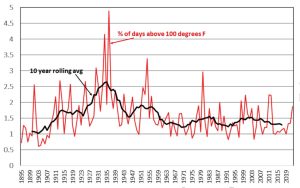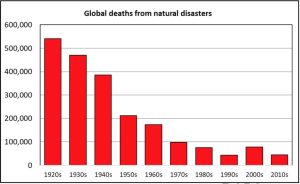Is Weather Really Getting More ‘Extreme?’
From Epoch Times‘ Kevin Stocklin column IN-DEPTH: Legal Storm Brewing Over Insurers’ ESG Agenda:
Despite the claim that weather is getting more “extreme,” some who track climate trends say the evidence suggests otherwise.
NPR wrote in January that “climate change makes heat waves, storms, and droughts worse,” and according to the EPA, record-setting daily high temperatures have become more common in the United States since the 1970s. However, according to a more extensive set of climate data, the 1970s were an unusually cool period, and heat waves were significantly more extreme a century ago than they are today.
Gregory Wrightstone, executive director of the CO2 Coalition, researched data over the past 100 years from the U.S. Historical Climatology Network (USHCN) and found that heat waves, measured as the number of days with temperatures over 100 degrees Fahrenheit, reached a peak in the 1930s and have been declining since.

Data from the U.S. Historical Climatology Network (USHCN) indicates heat waves were worse a century ago. (Courtesy of Gregory Wrightstone, USHCN)
Forest fires and hurricanes also appear not to be escalating.
Climate analyst Bjorn Lomborg wrote last week in a New York Post op-ed that “since the early 2000s, when 3% of the world’s land caught fire, the area burned annually has trended downward. In 2022, the last year for which there are complete data, the world hit a record low of 2.2% burned area.”
The New York Times has done extensive reporting on forest fires in the United States, Canada, and Australia, employing 40 staff members for its “Postcards From a World On Fire” project, which also included photorealistic animation. But their reporting omitted the fact that forest fires have declined.
“The Biden administration and the Times can paint a convincing picture of a fiery climate apocalypse because they selectively focus on the parts of the world that are on fire, not the much larger area where fires are less prevalent,” Mr. Lomborg stated.
A July 2021 report in Science News analyzed hurricane data from 1851 to 2019. The report “found no clear increase in the number of storms in the Atlantic over that 168-year time frame” and “more surprisingly … the data also seem to show no significant increase in hurricane intensity over that time.” While there has been short-term fluctuation in hurricane numbers and intensity, today’s patterns are consistent with historical averages.
Mr. Wrightstone researched data from the Centre for Research on the Epidemiology of Disasters and found that deaths from natural disasters worldwide have declined more than 90 percent from a century ago, down from an average of more than 500,000 deaths per year in the 1920s to 45,000 in the past decade.

Data collected from the Centre for Research on the Epidemiology of Disasters (CRED) shows a decline in deaths from natural disasters (Courtesy of Gregory Wrightstone, CRED).
The complete Epoch Times’ article, originally published August 5, 2023, can be accessed here.
